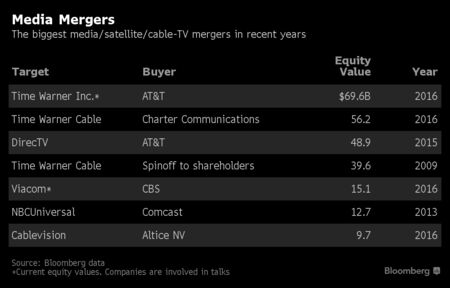AT&T Mulls Reinvention for Web With $86 Billion Time Warner Deal

Time Warner Inc. and AT&T Inc., companies that over the decades have survived the shift to talkies, color TV and cable, are contemplating a merger to adapt to the latest technological shifts: smartphones and streaming.
More consumers are getting their entertainment online from Netflix Inc. and watching on iPhones instead of TVs. That’s putting pressure on traditional entertainment companies and pay-TV providers. For many, it’s no longer enough just to make TV shows or own a cable company.
“You need to do both,” said Chris Marangi, co-chief investment officer at Gamco Investors Inc., which owns stock in both companies.
That logic is driving Dallas-based AT&T’s effort to buy Time Warner as two storied companies respond to changes reshaping the entertainment industry in 2016. AT&T, founded in 1885, is close to an agreement to buy the parent of the 93-year-old Warner Bros. film studio for about $110 a share, or an estimated $86 billion. An agreement could be approved Sunday and announced as soon as Monday, according to people with knowledge of the matter. The talks are ongoing and a deal could still fall through, the people said.
Pay-TV distributors like AT&T, the parent of DirecTV, are trying to prevent subscribers from dropping their services for cheaper online alternatives. They aim to own content they can offer wherever consumers want, whether it’s streamed to mobile phones or broadcast on TV.
AT&T’s chief rival, Verizon Communications Inc., has sized up in the challenge in a different way, opting for original programming designed specifically to be viewed on smartphones for its mobile video service, Go90. Verizon has been buying up companies like AOL and Yahoo! Inc. to become a player in the mobile advertising market.
New York-based Time Warner, which also owns CNN and HBO, is a rich target for AT&T. The media company has a vast library of movies and television series, such as the “Harry Potter” films and “Game of Thrones,” and is among Hollywood’s most prolific producers. Its annual revenue totals $28 billion.
Pressure to Sell
AT&T’s interest “demonstrates the embedded value of media content in distribution platforms,” said Steven Cahall, an analyst at RBC Capital Markets.The same industry pressures may explain Time Warner’s willingness to sell -- two years after rejecting a buyout offer from 21st Century Fox Inc. Time Warner, Walt Disney Co. and competitors like Viacom Inc. are all confronting similar threats: falling TV ratings as consumers drop or pare their cable-TV subscriptions for online alternatives.
The pay-TV distributors have been combining as well, building negotiating leverage to rein in the price increases media companies seek for their TV networks. AT&T bought DirecTV last year for $48 billion, creating the biggest U.S. pay-TV service, while Charter Communications Inc. did a $56 billion deal to swallow up Time Warner Cable Inc. -- a former unit of Time Warner.

“Time Warner is saying maybe there are limits to what they can do as a standalone entity,” said Marangi. A deal between the company and AT&T “could be the match that gets consolidation going on the content side.”
Some deals are already in the works. CBS Corp. and Viacom Inc., controlled by billionaire Sumner Redstone and his daughter Shari, are considering recombining after more than a decade as separate companies. In June, Lions Gate Entertainment Corp., the studio behind “Mad Men” and “The Hunger Games,” agreed to buy the premium cable network Starz, beating out a rival bidder -- AT&T.
Separately, both AT&T and Time Warner have been responding to the consumer’s desire to watch more movies and TV shows online. AT&T plans to unveil a new web-streaming TV service, DirecTV Now, that will carry dozens of cable channels over the internet. Time Warner’s HBO last year introduced an online version of its network for people who don’t want cable TV.
Unparalleled Scale
With Time Warner, AT&T would combine distribution and production on a scale unparalleled in traditional media, potentially creating new options. The phone giant already owns the second-biggest U.S. wireless network and the largest U.S. pay-TV footprint. The deal would make it one of the largest producers of entertainment as well.Such a combination is certain to face intense regulatory scrutiny. When it bought NBCUniversal, Comcast Corp. had to accept conditions so it wouldn’t be too powerful in the burgeoning web TV landscape. NBC was required to make all of its channels available to all new online TV entrants, weakening its negotiating leverage.
The entertainment division also was barred from exerting influence on the streaming service Hulu, which it partly owns. Hulu will soon unveil an online TV offering that competes with Comcast’s conventional cable service.
Analysts are divided over how valuable the NBC deal has been for Comcast and whether it makes sense for AT&T to own TV networks and production studios. While Comcast’s Universal film studio just had its best year ever, the company’s cable business has lost subscribers and some of NBC’s networks have seen audience ratings fall.
0 comments:
Post a Comment